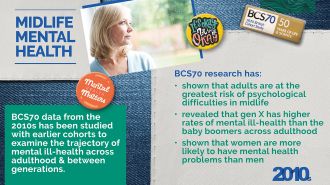
- Our studies
- Our research
- Publications and resources
- Data access and training
- About
- News
- Events
- Get in touch
- Join our mailing list

Welcome to our news and blogs section. Here you’ll find the latest developments and insights from across our longitudinal studies.
Young people from more deprived neighbourhoods have to wait up to 15 minutes longer for accident and emergency (A&E) treatment than their more advantaged peers with similar healthcare needs, according to new findings from Next Steps.

Up to one in five adults with a history of poor mental health reported they were ‘much worse off’ financially a year into the COVID-19 pandemic, compared to one in ten of those who had never had psychological problems in adulthood.
This webinar gives first-time users an insight into four internationally-renowned cohort studies run by the Centre for Longitudinal Studies (CLS).

The 1970 British Cohort Study (BCS70) has been an important source of evidence on midlife mental health, helping to improve our understanding about why middle age is such a vulnerable period for adults.

Baby Boomers and Generation X are at the greatest risk of mental ill-health in middle age, finds new research by UCL.

Britain’s birth cohort studies have been some of the leading sources of evidence on women’s education, employment and pay, helping us to monitor and understand the possible factors behind the gender wage gap.

The BCS70 Age 30 Sweep was conducted in tandem with the Age 42 Sweep of the 1958 National Child Development Study.

Members of Generation X who lived in Britain’s declining industrial heartlands in the 1980s were more likely to play truant during their school years and to be involved in crime as adults, compared to those who grew up in more advantaged areas.

Over the years, men who waited until their mid-20s to have their first child tended to report the best health in middle age, compared to those who started a family earlier. But, more recently, those who delayed fatherhood until their mid-30s appeared to be the healthiest in midlife.

Among the Baby Boomers and Generation X, people who had higher levels of emotional wellbeing during childhood and adolescence were more likely to report being satisfied with life when they reached adulthood.
At this event, organised by CLOSER, we will present results on the measurement properties of mental health measures, before and after harmonising these so that they can be compared across time and study.
CLS are pleased to be presenting at this CLOSER workshop aimed at lecturers. This free one-day workshop will give an overview of longitudinal data available to lecturers who teach and supervise students in quantitative social science subjects.

Children who get on with their peers are more able to cope with stressful events in mid-life, new findings show.
Ryan Bradshaw
Senior Communications Officer
Phone: 020 7612 6516
Email: r.bradshaw@ucl.ac.uk